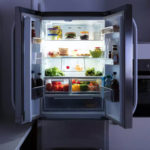Classifying Food for the Tet Holidays: Storing it in the Refrigerator
When purchasing food reserves for Tet, it is advisable to categorize them into three main groups: perishable items, pre-packaged cooked food, and a variety of produce including vegetables, roots, and fruits.
To ensure the prevention of bacterial cross-contamination from fresh food to cooked food, it is essential to properly organize the food compartment. It is important for everyone to be mindful of food preservation in order to fully savor the Tet festivities.

Rearrange Menu for the Perfect Barbecue
Properly organizing food items is of utmost significance.
Properly arranging the contents of each refrigerator compartment is vital to maintaining optimal temperatures for different types of food. By doing so, we can prevent food from being excessively cold or warm, thereby preserving its freshness and warding off bacterial spoilage.
To ensure efficient meal preparation, it is recommended to separate foods that do not require immediate cooking from those that need to be cooked on the same day. By placing non-cookable items on the inside, and reserving the outer space for the day’s cooking essentials, you can conveniently prepare meals for your family.

Tips for Storing Fresh Food to Prolong Shelf Life
Fresh food refers to food that is unprocessed and has not undergone any procedures or alterations. It is food that has not been subjected to freezing, canning, or any other preservation techniques. Fresh food is typically considered to be more nutritious and flavorful compared to processed food.
In order to ensure food safety, it is important to properly clean fresh foods such as meat and fish before storing them in the refrigerator. For fish and shrimp, it is recommended to remove the gut and head, scale, and clean them thoroughly before refrigerating.
To prevent the refrigerator from developing an unpleasant odor, it is recommended to lightly boil the fish and store it in a plastic bag or a tightly sealed container before freezing. This will help contain the strong fishy smell.
When it comes to meat, simplicity is key. Begin by thoroughly washing the meat to ensure cleanliness. Next, securely place the meat in plastic bags to maintain its quality and freshness. Following these steps will ensure optimal meat preparation.

To properly store meat in the freezer, it is recommended to wrap it tightly with multiple layers of plastic bags. This will help prevent excessive freezing, water loss, and sticking to the freezer.
To ensure proper food handling and storage, it is recommended to divide the meat into individual portions for daily consumption. This can be done by packaging each portion into separate bags. By doing so, you can easily retrieve and thaw the required amount each time. It is important to avoid thawing all the meat at once and then re-freezing it, as this can compromise the quality and safety of the food.
Effective Methods for Prolonging the Shelf Life of Dairy Products
To preserve the quality of milk, it is advisable to avoid storing it with green vegetables, strongly smelling foods, or fruits as milk has the tendency to absorb odors.
To ensure the quality and freshness of your dairy products, it is important to store them properly. Milk should be stored separately from certain foods, as it can absorb their odors and develop an undesirable smell. When it comes to cheese, it is best to use plastic bags or food wrap before refrigerating it. This not only helps prevent the cheese from drying out, but also minimizes the risk of bacteria spoiling the cheese. By following these storage guidelines, you can keep your dairy products at their best, ensuring a pleasant taste and aroma.

“Refrigeration Prolongs the Freshness of Veggies, Roots, and Fruits”
After purchasing vegetables, it is imperative to wash them meticulously, ensuring that any rotten leaves are promptly discarded. For roots and fruits, the removal of any crushed or overripe sections is recommended. Following these steps, it is advised to store the vegetables in a refrigerator for optimal freshness.
To extend the freshness of vegetables like cabbage, celery, and lettuce, consider wrapping them in aluminum foil. However, it’s important to keep in mind that other types of vegetables, roots, and fruits should only be stored for a maximum of 2 to 5 days.
It is not advisable to refrigerate processed vegetables during Tet days, such as pickled cabbage or salted vegetables. This is due to the rapid development of bacteria present in the salted food, which can potentially lead to the formation of carcinogens. Consequently, individuals who frequently consume pickled vegetables are at a higher risk of developing stomach cancer.

World Food Programme Suggests Donating Leftover Food Items to Local Shelters
It is important to take proper care of leftovers to maintain food safety and prevent spoilage. Before storing them in the refrigerator, ensure they are properly wrapped or covered. This practice helps contain bacteria and maintain the quality of the food. To avoid having excess leftovers, it is advisable not to cook more than necessary for a single meal. This mindful approach minimizes wastage and ensures freshness.
To ensure optimal food storage, please follow these guidelines:
1. Allow the cooked food to completely cool down.
2. Cover the food with plastic wrap.
3. Place the covered food in the refrigerator.
Note: It is important to refrigerate cooled food to prevent deterioration, moisture retention, and potential harm to other foods and your health when hot food is stored in the refrigerator.
Research suggests that cooked food should only be stored in the refrigerator for a maximum of 5-6 hours to prevent the growth of harmful bacteria. It is important to avoid leaving cooked food out for extended periods of time, as bacteria can produce toxins that can be detrimental to human health. The high temperatures of cooking (100ºC or above) effectively kill bacteria, but proper storage afterwards is crucial to maintain food safety.
Exploring the Special Cuisine of Yunnan Province
There are certain types of foods that require special storage considerations. These include:
Eggs Storage:
Ensure that eggs are properly cleaned before placing them in the refrigerator. It is recommended to avoid storing eggs on the side door of the refrigerator.
Scallions storage: To properly store scallions, begin by cleaning them and discarding any damaged leaves. Proceed to cut them into small pieces before transferring them into plastic jars. Rather than refrigerating, it is recommended to freeze them, thereby extending their shelf life significantly.
For herbs and spices like cilantro: First, clean the herbs and cut them into small pieces. Mix them with olive oil and then divide them into small portions. Place these portions in the freezer to make ice cubes, ensuring that the flavors are preserved for longer periods of time. This method also provides convenience when using them in your dishes.

Don’t forget the essential steps to ensure a delightful Tet celebration with flavorful dishes, crafted from the finest ingredients, meticulously stored in the refrigerator prior to Tet.
More Useful Advice for Homemakers (Part 2)
Have you heard of the surprisingly easy tips to make cooking and household chores simpler? White radish eliminates the acrid taste of salted meat, adding alum to raw shrimp helps soften it, and adding cold water when frying eggs can make them crispy – these are just a few of the tricks to make your life easier.
8 Common Mistakes People Make with Cutting Boards
Are you using your cutting board correctly? Many Vietnamese households rely on cutting boards in their kitchen, but not everyone knows how to use them properly, especially when it comes to wooden cutting boards. Check out these 8 mistakes to avoid when using a cutting board to ensure both hygiene and safety for everyone in your family.
Is Refrigerated Leftovers Linked to an Increased Risk of Cancer?
Dr. Lam Van Man, Head of Research, Development and Technology Transfer Department of the Institute of Safety Food, has warned of the risk of food poisoning when reheating leftovers from the refrigerator. But what should we be aware of when it comes to the possibility of these leftovers causing cancer? Here, we explore what the experts have to say on the matter and offer some tips for safe eating.





































